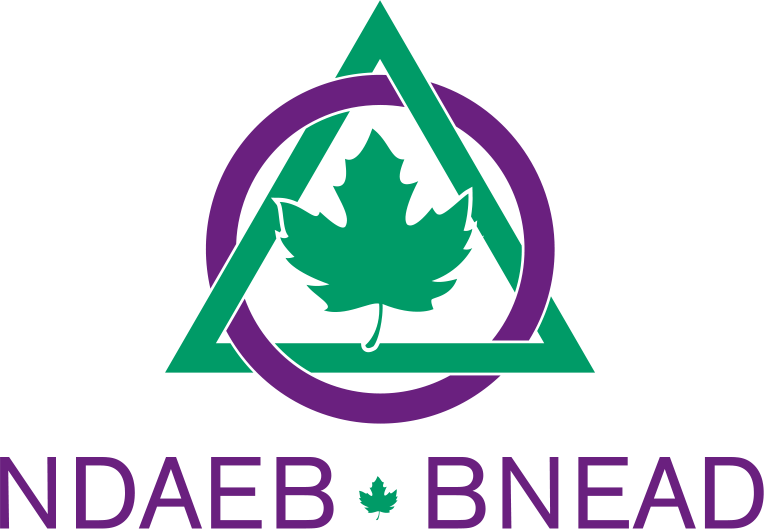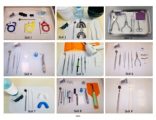General Information for Graduates from Outside of Canada
Candidates educated outside of Canada are considered International applicants. Qualified persons educated outside Canada may apply to write the NDAEB examination. Applicants must be prepared to provide proof of education which is substantially equivalent to the NDAEB standard.
To be eligible to write the NDAEB examination, applicants must be qualified as intra-oral (Level II) dental assistants, through formal dental assisting education or other formal allied dental healthcare educational programs such as dentistry or dental hygiene. At minimum candidates must show proof of formal education in the following mandatory skills:
-
Chairside dental assisting (Level I)
-
Exposes dental radiographs
-
Provides oral hygiene instruction
-
Provides dietary counselling relative to oral health
-
Applies and removes dental dam
-
Performs selective rubber cup polishing
-
Applies anti-cariogenic agents
-
Obtains preliminary impressions
-
Applies and removes matrices and wedges
-
Applies treatment liners (no pulpal involvement), acid etch and bonding materials
-
Applies pit and fissure sealant
-
Applies desensitizing agents
-
Applies topical anaesthetic
-
Performs tooth whitening using trays
-
Performs suture removal
-
The NDAEB requires applicants to be educated to perform the mandatory skills as the operator as opposed to assisting a dentist with the procedure.
International Candidates and the CPE
The NDAEB written exam constitutes Part I of the mandatory two-part NDAEB certificate for international applicants. Part II requires the successful completion of the NDAEB Clinical Practice Evaluation (CPE). For details on the CPE, please see the CPE Candidate Handbook.
International applicants may choose to attend intra-oral (Level II) upgrading at a Canadian dental assisting program rather than challenge the CPE. Upgrade programs must include the following intra-oral skills:
-
Skill 1: Exposes digital radiographic images
-
Skill 2: Obtains impressions for study models
-
Skill 3: Applies and removes dental dam
-
Skill 4: Selective coronal polishing
-
Skill 5: Applies treatment liner
-
Skill 6: Applies and removes matrix band and wedge
-
Skill 7: Applies anti-cariogenic topical fluoride gel
-
Skill 8: Applies pit and fissure sealant
-
Skill 9: Applies topical anesthetic
Applicants choosing to attend academic upgrading in lieu of the CPE are advised to attend a program accredited by the Commission on Dental Accreditation of Canada (CDAC). Please refer to the list of schools on this website.
Applicants should be aware that while the NDAEB recognizes upgrading completed at schools listed on its website, some Canadian Dental Assisting Regulatory Authorities (CDARA) may require non-accredited program graduates to complete the Clinical Practice Evaluation prior to considering them for licensure or registration.
Written Exam Candidate Handbook
When applying to write the NDAEB exam, please read the information on the exam application and in the Candidate Handbook carefully. Details regarding all aspects of exam administration, including application processing, exam preparation and post exam administrative details are available in the Candidate Handbook.
CPE Candidate Handbook
The NDAEB written exam constitutes Part I of the mandatory two-part NDAEB certificate for international applicants. Part II requires the successful completion of the NDAEB Clinical Practice Evaluation (CPE). For details on the CPE, please see the CPE Candidate Handbook.
Application Procedure for International Candidates
-
The requirement for the NDAEB certificate is determined by the Canadian Dental Assisting Regulatory Authorities (CDARA)
-
You are advised to confirm the requirement for the NDAEB certificate in the province where you intend to work before applying to the NDAEB.
Applicants who have completed formal dental assisting or related training programs outside Canada (e.g. including dentistry or dental hygiene) must have their theoretical and clinical education assessed by the NDAEB Candidate Eligibility Assessment Committee (CEAC) to determine eligibility to complete the national examination process.
To be considered for NDAEB exam eligibility, candidates must follow the steps below:
Step #1: International Credential Verification
Candidates must have their credentials verified by one of these two methods:
Method 1
International candidates may have their credentials verified by an NDAEB recognized agency specializing in the authentication and comparison of foreign academic credentials to the Canadian education system.
An original report must be submitted directly from the agency to the NDAEB office. If the candidate wishes to submit their agency report to the NDAEB, their report must be certified/notarized in Canada by a notary public, commissioner of oaths, or lawyer. The NDAEB will not accept reports non-certified/non-notarized if received from the candidate.
The NDAEB recognizes the reports from the following three (3) agencies:
International Credential Evaluation Service (ICES)
3700 Willingdon Avenue
Burnaby, BC V5G 3H2
Telephone: 604-432-8800
Report Required: Comprehensive Report
International Qualifications Assessment Service (IQAS)
9942 - 108 Street
Edmonton, AB T5K 2J5
Telephone: 780-427-2655
Report Required: Basic Report with Dental Assisting Course Work Report (DACWR) Review
World Education Services - Canada (WES)
2 Carlton Street, Suite 1400
Toronto, Ontario M5B 1J3
Telephone: 780-427-2655
Report Required: Course-By-Course Report
Method 2
Candidates may submit their credential approval from the National Dental Examining Board (NDEB). Proof of approved NDEB Equivalency Process is to include a copy of the online profile from their “NDEBConnect” account which includes at minimum:
- Photo and contact information;
- Applicant information (demonstrating “approved” status);
- Examinee Information; and,
- Documents submitted.
It is at the NDAEB’s discretion whether a copy of the NDEB profile page will be acceptable. Candidates will be contacted directly by the NDAEB if further NDEB documentation is required.
Step #2: NDAEB Eligibility Assessment
Submit the agency report obtained in Step #1 to the NDAEB along with the following payments and documents:
-
The International Applicant Credential Assessment Fee payable in Canadian dollars to the NDAEB by money order or bank draft. The NDAEB does not accept credit/debit cards, personal cheques or cash for the International Credential Assessment Fee at this time.
-
Copies of academic transcripts and diploma that have been certified/notarized as true copies of the original by a commissioner of oaths, notary public, or lawyer in Canada. If original documents are not in English or French, translated copies must also be submitted and must be certified/notarized as true copies of the original by a commissioner of oaths, notary public, or lawyer in Canada.
-
A completed Dental Assisting Course Work Report (DACWR) available on this website. Candidates submitting their documents to IQAS must submit the DACWR directly to IQAS.
-
A signed Consent for Personal Information Form available on this website.
-
If the name appearing on the academic records or other documents is different from the name used in your application, a copy of a marriage or divorce certificate, sworn affidavit or proof of legal name change is required for the NDAEB to verify and reconcile the name on the application with the name appearing on the documents submitted. Documents issued outside of Canada must be certified/notarized by the commissioner of oaths, notary public, or lawyer in Canada.
-
Graduates of a Dental Assisting program (or other equivalent formal allied dental health care program) achieved outside of Canada require a NDAEB Program Survey provided by the candidate’s educational program clearly indicating the mandatory core skills required for NDAEB exam eligibility were included in the program. If an outline is not currently on file, the NDAEB will contact the program directly to request the NDAEB’s Program Survey be completed on behalf of the candidate. Applicants must provide the NDAEB with the school name, mailing address, email/contact information and name of the program director/instructor (or other appropriate administrator) who will complete the survey. If the program does not submit to the NDAEB office the required Program Survey, the NDAEB may not grant exam eligibility.
Important Information When Submitting Documents
Candidates are permitted to submit their required documents to the NDAEB office BEFORE the credential assessment is completed by the selected agency. Please advise the NDAEB office in writing as to the date your application and documents were sent to the agency. Documents received by the NDAEB will be held on file in pending until such time as the credential assessment report is received.
Upon receipt of all required documents, the NDAEB will then consider your eligibility to write the national exam.
- If in the opinion of the NDAEB, your education in dental assisting or allied dental profession is considered substantially equivalent to the Canadian standard, exam eligibility may then be granted.
- If in the NDAEB’s opinion, your academic education is not considered to be substantially equivalent to the standard for dental assisting in Canada, you will be directed to a Canadian dental assisting education program for the required upgrading should you wish to attain the NDAEB certificate.
Educational Upgrading
In the event your dental assisting education does not meet the standard required for exam eligibility, you may wish to attend an educational upgrading program in Canada. International applicants considered eligible for the NDAEB examination may wish to attend upgrading in the clinical component (9 intra-oral skills) rather than sit the Clinical Practice Evaluation (CPE). Applicants successfully completing intra-oral upgrading at a Canadian accredited school will not be required to complete the CPE by the NDAEB but will be considered graduates of a Canadian accredited program. Should you decide to attend upgrading in Canada, be aware many Dental Assisting Regulatory Authorities require graduates of Canadian non-accredited programs to undergo the CPE prior to being considered for licensure/registration/certification. Please refer to the list of dental assisting schools available on this web site.
The entry requirements to Canadian dental assisting educational programs are set by the educational institution and not the NDAEB.
Working in Canada as a Dental Assistant
The NDAEB examination and CPE are available only in Canada. Persons applying for exam eligibility from outside Canada must be aware that the granting of exam eligibility by the NDAEB in no way assures or implies acceptance for immigration or entry to Canada, nor does it guarantee the likelihood or possibility of attaining employment in Canada. For information regarding Canadian immigration policy and procedures, please contact Canadian immigration authorities.
In most Canadian jurisdictions, provincial registration/certification/licensure is required before you are able to work as a dental assistant. Please contact the appropriate Canadian Dental Assisting Regulatory Authority or dental assisting association for information. See the list on this web site in the area “Registration and Licensure”.












